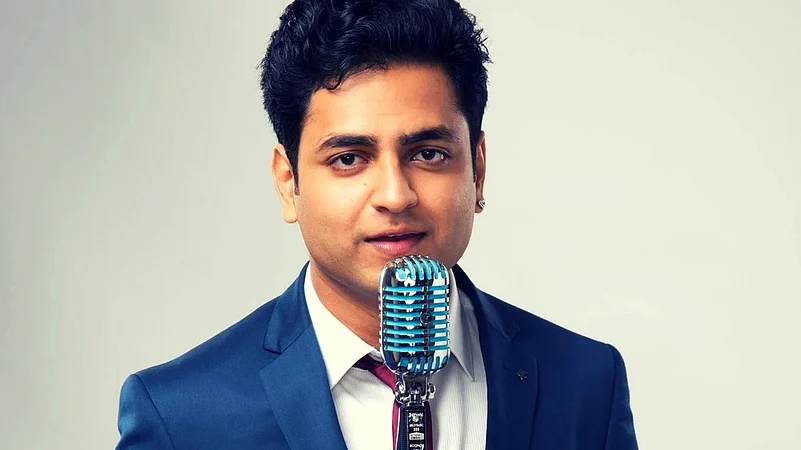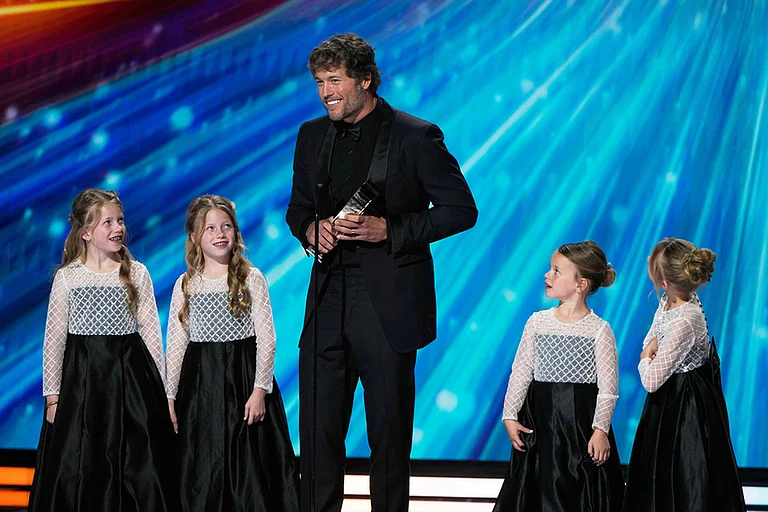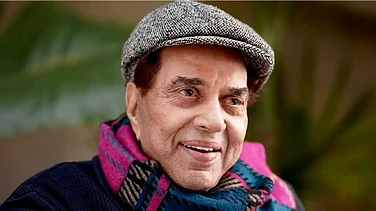Kenny Sebastian is one of the most popular stand-up comics of the country. He has been performing across the globe and has been selling stadiums out. It has been a great time for stand-up comedy in general with loads of people wanting to do stand-up comedy, and Kenny Sebastian is undoubtedly the crème de la crème of the lot. He has been able to not only garner immense fan following doing live performance but even on social media and YouTube, he has become hugely popular.
Talking to Prateek Sur, Kenny Sebastian opens up about how his most recent collaboration with ‘Savour The Pause’ initiative. He also talks in general about how he gets his source material, how he is able to never repeat a joke that has been used once, how he feels he stands out from other stand-up comics because of his background, how he handles hecklers on stage, how his comedy has changed over the years, how audience perception has changed and lots more.
Excerpts from the candid conversation:
How do you resonate with ‘Savour the Pause’ Initiative?
I think it’s a really cool initiative by Black Dog Soda because I think especially now with everybody’s raising anxieties and workload and stress and inflation and global warming and it’s a nice message to spread out that sometimes not every second of your life has to be dedicated to productivity or to achieving something. And maybe sometimes taking a minute for yourself is a great way to just appreciate what you already have and enjoy what you already have. And I think it nicely complements a night of comedy because comedy is not a tangible or profitable thing. You come for the comedy show to sit down, laugh and have a have a good time and you leave happier and that’s it. There’s no prize for that. And I think that’s priceless. So, it’s a great marriage of two ideas.
How do you come up with your comedy material? What is your key source for me you to get the maximum ideas for your sets?
My key source, I sound like a journalist (laughs). My key source is life itself. It always has been. I really believe in what Seinfeld does. I remember watching him at the Beacon Theater in New York. I had the privilege of watching my comedy inspiration life. And it dawned on me, that Seinfeld could have been, on House arrest for his entire life and he could churn out hours and hours of comedy, just talking about curtains and switches and floors and sofa, as that’s the power of his observation. You don’t need to “live a very eccentric life” to have interesting stories. Everybody’s life is beautifully interesting and impactful. So that’s where I am. And how do I come up with this? I’ve been doing this for 14 years. It’s a lot of practice, technique, and skill. But yeah, it just comes from the heart. I guess having a background in theatre and music and film helped me kind of understand the basic rules and structures of storytelling. But end of the day, I think I was meant to do this. I used to love performing and making jokes for my friends and family, and it luckily turned out to be what I do for a living.
What do you think sets your style of comedy apart from others in the industry?
I think I’m one of the few comics that does really clean material, is family-friendly, has music in it, has a tinge of absurdity and relativity. And my storytelling skills are quite strong because of my background in film and writing. So, I think I make sure that my content can be enjoyed by any age group and from any background. I think that that kind of makes me quite accessible and also unique because of my unique upbringing as an Indian Navy kid, who travelled across so many cities in India at a young age. And with me now travelling the world, it also added so many more stories.
Do you think comedy is one great means to address crucial subjects like mental health?
Well, I think this comes back to the hypocrisy of the audience in general. I think in an ideal society, a mental health activist should have two, three, four, 10 million followers on Instagram or YouTube. They should be selling out stadiums. But the human mind wants entertainment. And if it wants entertainment, it does not want to put effort into education or awareness. So that has to be put into entertainment and then it’s put into entertainment in a very one-dimensional way and then it’s criticised. So, yeah, I think it’s quite sad that people expect jokes to educate them about mental health. I think it’s everybody’s prerogative and responsibility to do the bare minimum and find out about mental health. We are not children, we are adults, and it’s not for an entertainer to do that. If they do, my God, amazing. Good on them. But it is very annoying and frustrating that mainstream films, music, comedy and art have to do what everybody should be doing themselves, which is educating themselves.
How do you handle hecklers or unexpected moments during your performances?
I guess it’s an occupational hazard. I think it’s like asking a firefighter, what do you do when your ladder breaks or the water connection is unstable? I’m not saying I’m a firefighter, but I think you do it so many times. You meet so many people who interrupt you or heckle you. Comedy has so many unexpected moments. Genuinely, after doing this for 14 years, I still have no idea how the show is going to turn out till I do the show. Anything can happen. And that’s why I also love this field. I think that’s why there are such few people who do stand-up because it’s such a demanding and brutal profession. You face social rejection and you face it every day. If a job doesn’t work, it’s quite unnerving. I’ve been a musician and playing music and playing a song is far more enjoyable because while you’re playing it, you don’t need a reaction from the audience. But comedy needs a reaction every few seconds. And if your material isn’t good, you know it. It’s quite painful for everybody involved.
Can you share a memorable experience or a moment from one of your live shows?
Yeah, we did a world tour last year - we did about 120 shows across the world in 65 cities. We sold about 45,000 - 50,000 tickets. It was incredible. Many countries in Europe I hadn’t done shows in before this. I was in Sweden and just as a rhetorical question I said “Before I start the show, do you want to tell me anything?” I was in Stockholm and five or six people raised a hand and they just started, you know, complimenting me, telling me how they love my work and how they think I’m very talented, that I brought them a lot of joy. And that was so unexpected because you expect people to just ask you silly questions and then you start the show. But they made a point to kind of, let me know how much they like me and my work and that is so heartwarming and it was very overwhelming also. It threw me off and then I didn’t know how to start my show. But there are also a lot of surreal moments. We performed at the Kennedy Center in Washington, D.C., which we sold out and then we sold out New York as well. And we performed at the Palladium in Times Square, which was insane. Having gone to America in 2014, and having a budget of about $10 a day for food, to now having lines across the block at Times Square at a 1200-seater, it’s just mind-numbingly incredible. And doing my biggest show in San Jose at the San Jose Civic selling about 3000 tickets, I couldn’t believe this was my life. So, it’s incredible.
How has your comedy changed over the years since you first started performing?
That’s a great question. It’s changed a lot. It went from very straightforward observational comedy to very personal and opinionated. I think as you grow older, you kind of get a sense of who you are and what you think of the world. And that comes across in my comedy now. I want to talk about things that I’m very passionate about and things I am effective in speaking out about - things that I think are wrong, i.e. my personality and voice has become stronger. The rest is still pretty much observational and clean, and in terms of my audience, anybody in the family can watch my show. So that’s stayed the same.
How has your perception of jokes changed over the years? And has the audience’s perception towards the jokes changed over the years?
You have your jokes which audiences used to laugh at back in 2015, but that joke falls flat outright when you perform now. Musicians can perform a song that is very popular over and over again. As a comedian, you can’t. Once you hear the joke, the jokes are done the surprise is gone. So, we don’t repeat jokes, at least I don’t. Whatever jokes I tour with or perform with, I release them and it’s out in the world and then never repeat them. So, I don’t have this problem. But yeah, if you didn’t release it, if you do a joke from 2015, that would not work now. And audience perception of my jokes and jokes in general have changed. They have become more evolved, and more exposed, which is great for us. We can push more boundaries or have more layers in-jokes.
Who are some of your comedic influences? Your favourite comedians?
Jerry Seinfeld, John Mulaney, Dave Chappelle. These are my top three favourites. I obviously watch Billboard and Richard Pryor and Ricky Gervais, to be honest, all the big great comedians, Ali Wong, are the usual suspects. I love all of them. But Seinfeld has had a very, very long-lasting effect on me. And John Mulaney is known as the new generation of Seinfeld, and so I’m a fan of his as well.
What advice would you give to aspiring comedians who are just starting out?
To do it for the right reasons. When I was starting off, it wasn’t a profession, so we were just happy we could do jokes. Now, I think people are aware it’s a profession, so people get caught up on the status and the prestige and the money of it. And, very few make it, many of us are here because we work very hard, but we’re also very lucky. And things worked out. And I know many comics who work really hard and things haven’t turned out the way they expected and it really affects them and even sometimes affects me as well when I think of certain things which don’t go the way I want. And I remind myself that the reason I do comedy is because I can’t imagine doing anything else. I just love telling jokes on stage to people making them laugh and entertaining a room. And I still can’t believe this is my job. So, I think I would tell new comedians that it’s a very long, winding road. I’ve been doing this for 14 years and I saw my first sold-out show after five years of doing comedy. So, it’s quite painful, you know, that journey. And some comedians won’t see that for ten, 15 years. So just do it for the right reasons. And then you have the motivation to get through this journey.
If you had to advise an 18-year-old Kenny Sebastian, what would that advice be?
That comedy’s not about a lot of insecure comedians and producers and other people in the industry constantly telling me how this is a bubble. It’s going to burst. Comedy is going to become old. Stand-up doesn’t have a lot of shelf life. And all of them are wrong. I was 18 years old when I started and I’m 33 and it’s the best standup has ever been. So, I think I would tell 18-year-old Kenny Sebastian to just do what you’re doing. Don’t be so scared of the uncertainty of the profession. Just make sure you’re doing good work.
How do you balance adding new material with performing regularly? Do you get time to read new books? Are watching your shows as to model for a stand-up comedy piece?
I don’t get any material from books or shows. It comes from life itself. I think it’s very win-win when I focus on living life more than watching TV or consuming material as life gives me the best material for standup. And focusing on health. If I’m not in good health and not getting my exercise, sleep or food and not hanging with my friends or family, then I can’t create material. I think I have to be emotionally happy to write good material.
What keeps you busy when you’re not performing on stage or writing your next stand-up piece?
I think the dual professional of being a content creator, writing producing and shooting on YouTube is so time consuming, and living a life and having a home with friends and the family itself also is so time-consuming. But I love exercising, riding my motorcycle and maintaining my car. And I think just living life in itself, it’s quite a time-consuming thing. And I produce my videos. So, managing that takes up a lot of my time, but I really enjoy reading and sketching and painting and singing and learning new songs and playing video games and travelling. So, it’s a good life. That’s how I keep busy and that constantly gives me new material and gives me new stories to write new material.
Any upcoming projects?
Yes. I’m working on a brand-new comedy music show. My last show, ‘Professor Of Tomfoolery’ was mostly stand-up. This time I’m writing a music-based show, so very excited to do that.























